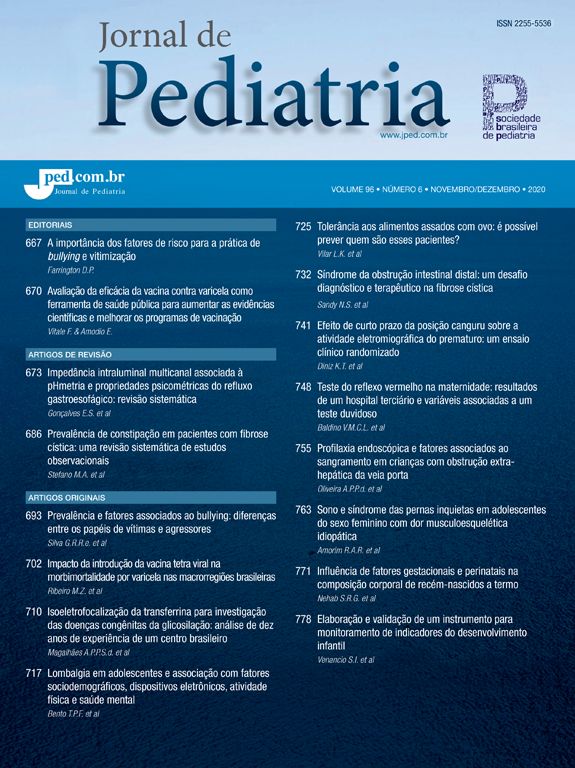: To determine the association between family structure, maternal education level, and maternal employment with sedentary lifestyle in primary school-age children.
Method: Data were obtained from 897 children aged 6 to 12 years. A questionnaire was used to collect information. Body mass index (BMI) was determined using the age- and gender-specific Centers for Disease Control and Prevention definition. Children were categorized as: normal weight (5th percentile ≤ BMI < 85th percentile), at risk for overweight (85th ≤ BMI < 95th percentile), overweight (≥ 95th percentile). For the analysis, overweight was defined as BMI at or above the 85th percentile for each gender. Adjusted odds ratios (adjusted ORs) for physical inactivity were determined using a logistic regression model.
Results: The prevalence of overweight was 40.7%, and of sedentary lifestyle, 57.2%. The percentage of non-intact families was 23.5%. Approximately 48.7% of the mothers had a non-acceptable educational level, and 38.8% of the mothers worked outside of the home. The logistic regression model showed that living in a non-intact family household (adjusted OR = 1.67; 95% CI = 1.04-2.66) is associated with sedentary lifestyle in overweight children. In the group of normal weight children, logistic regression analysis show that living in a non-intact family, having a mother with a non-acceptable education level, and having a mother who works outside of the home were not associated with sedentary lifestyle.
Conclusion: Living in a non-intact family, more than low maternal educational level and having a working mother, appears to be associated with sedentary lifestyle in overweight primary school-age children.
: Determinar a associação entre a estrutura familiar, o nível de escolaridade e emprego da mãe com o estilo de vida sedentário em crianças em idade escolar primá- ria.
Método: Foram obtidos os dados de 897 crianças com idade entre 6-12 anos. Foi utili- zado um questionário para registrar as informações. O índice de massa corporal (IMC) foi determinado utilizando-se a definição específica para idade e sexo do Centro de Controle e Prevenção de Doenças. As crianças foram classificadas como: peso normal (5°-85° percentil), risco de sobrepeso (percentil ≥ 85° e < 95°), sobrepeso (percentil ≥ 95°). Para análise neste estudo, sobrepeso foi definido como IMC igual ou acima do 85° percentil para cada sexo. As razões de chance ajustadas (RCs ajustadas) foram determi- nadas para inatividade física utilizando o modelo de regressão logística.
Resultados: A prevalência de sobrepeso foi de 40,7%, e estilo de vida sedentário, 57,2%. O percentual de famílias de pais separados foi de 23,5%. Aproximadamente 48,7% das mães apresentaram um nível de escolaridade não aceitável, e 38,8% eram mães que trabalhavam fora de casa. Os resultados do modelo de regressão logística mostram que o fato de viver em um ambiente familiar com pais separados (RCs ajustadas = 1,67; IC 95% = 1,04-2,66) está associado ao estilo de vida sedentário em crianças com sobre- peso. No grupo de crianças com peso normal, a análise de regressão logística mostra que viver em uma família com pais separados, com a mãe apresentando nível de escolaridade não aceitável e/ou trabalhando fora de casa, não eram fatores associados a estilo de vida sedentário.
Conclusão: Morar com uma família de pais separados, mais do que ter um baixo nível de escolaridade materno e uma mãe que trabalha fora, parece estar associado a um estilo de vida sedentário em crianças com sobrepeso em idade escolar primária.
Como citar este artigo: Vázquez-Nava F, Treviño-Garcia-Manzo N, Vázquez-Rodríguez CF, Vázquez-Rodríguez EM. Association between family structure, maternal education level, and maternal employment with sedentary lifestyle in primary school-age children. J Pediatr (Rio J). 2013;89:145−50.










